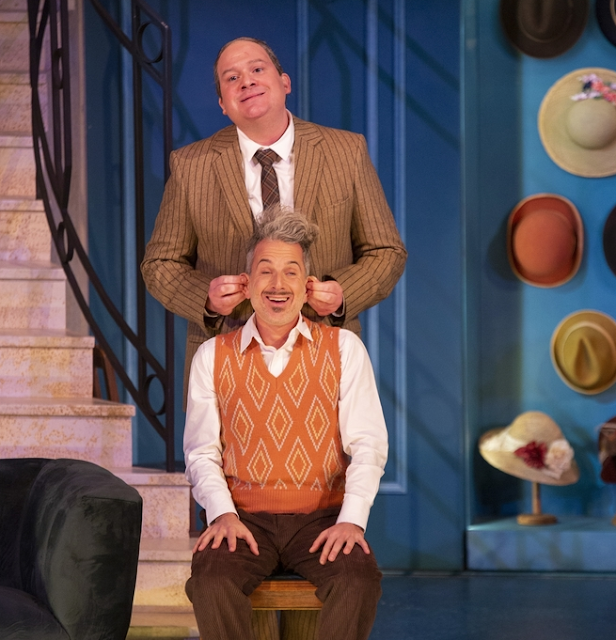Hahn - Ô mon bel inconnu
Athénée-Théâtre Louis Jouvet, Paris, Wednesday April 12 2023
Conductor: Samuel Jean. Production: Émeline Bayart. Sets and costumes: Anne-Sophie Grac. Lighting: Joël Fabing. Prosper: Marc Labonnette. Antoinette: Clémence Tilquin. Marie-Anne: Sheva Tehoval. Félicie: Émeline Bayart. Claude: Victor Sicard. Jean-Paul, M. Victor: Jean-François Novelli.
Hilarion Lallumette: Carl Ghazarossian. Orchestre des Frivolités Parisiennes.
 |
| Photos: Marie Pétry |
Bru Zane strikes again. On Wednesday night, I went to see a time-capsule operetta (1933), Sacha Guitry and Reynaldo Hahn's Ô mon bel inconnu, at the Athénée Louis Jouvet, a belle époque time-capsule theatre (1896) around the corner from the Palais Garnier. Hahn's score is erudite and chamber-music-like, often nostalgic in feel, yet remains light and frothy. Guitry's text is far from woke, but clever and funny and full of rapid-fire puns, not just corny and/or cloying like many operetta libretti. For those who read the language, the work is described in full, plot and score, in crisp, pre-war French, in Le Ménestrel's review of the premiere (published on October 13, 1933). In A Million Miles from Broadway: Musical Theatre Beyond New York and London, Mel Atkey sums it up in English as follows:
'Ô mon bel inconnu (“O My Handsome Stranger”) (is) about a married man who joins a lonely hearts club, unaware that the three women he is corresponding with are in fact his wife, his daughter and his maid. American opera historian Richard Traubner says it was “too refined and slight for a public that was slowly nurturing a taste for thumping spectaculars.”'
The 1933 production had Arletty, no less, as the maid (who in her letters, by the way, pretends she's a countess). In the following clip, Arletty sings a couple of short excerpts with Hahn himself, whose gifts as a 'salon' singer were, to my mind, considerable. If you don't already know it, look up on YouTube a clip labelled 'Reynaldo Hahn chante Offenbach 1927': his singing in these cheeky little songs seems to come as naturally as everyday speech, and his diction is extraordinary, especially by today's hot-potato standards*. Here's the clip with Arletty:
The current production is modest, in two simple sets. The first doubles as Prosper's family home and his millinery business: the blue-green panelling slides away to reveal shelves of colourful hats. A sweep of stairs to the left lead up to three bedrooms. The second, once the action moves to the Basque country, is a columned seaside villa, with the same stairs to the left, and the 30s 'city' costumes give way to navy-and-white stripes.
A work of this kind obviously calls for soloists who can both sing and act, and there's always a risk with operetta that excellent acting will mean amateurish singing. But this is a Bru Zane production, so you know care will have been taken to achieve a good balance; and the size of the Athénée - 590 seats in all - while exposing the singers, is kind to them insofar as they have no need to bawl to be heard.
Marc Labonnette really dominates this production, leading the action with unflagging energy, yet still handling nicely the change from exasperated and angry to kind-hearted and understanding: Guitry's plot has its subtleties, it isn't all simplistic caricature. Émeline Bayart, also the show's stage director, deliberately, I think, aims to bring Arletty to mind, a risky thing to do, but one she carries off with convincing gouaille - the pre-war Paris equivalent of London's cockney cockiness that Arletty archly epitomised.
What Le Ménestrel's reviewer had to say about René Koval in 1933 applies equally to Carl Ghazarossian today: 'While he can only express himself (except at the very end of the work) through physiognomy and gestures, he has managed to make them extraordinarily expressive.' The role is mute until Lallumette discovers, at the end, he can sing. Ghazarossian plays it with Chaplinesque charm - also, I think, aimed at deliberately. Jean-François Novelli throws himself into his two roles with almost slapstick élan, more successfully as Jean-Paul than as M. Victor.
Clémence Tilquin, Sheva Tehoval and Victor Sicard are all three vocally beyond reproach, but the director could have injected an extra spark of verve and espièglerie into their acting, which somehow, even though the production is now well 'run in', seems somehow a tiny bit too reserved - but certainly not enough to undermine a welcome escapist evening: as I said above, a 'time-capsule' sort of experience, bringing a breath of 30s insouciance to grumpy, 21st-century Paris.
The Orchestre des Frivolités Parisiennes, in the Athénée's little pit, with just a piano and ten players, plays the score beautifully, with all the care and delicacy it deserves. So I'll end by quoting someone posting on a well-known US opera forum: 'God bless Palazzetto Bru Zane for making this and so many others of the same period available.'
*****
This link is to an article (in English) about the 1896 theatre, with photos.
*Here, I've done it for you:





Comments
Post a Comment